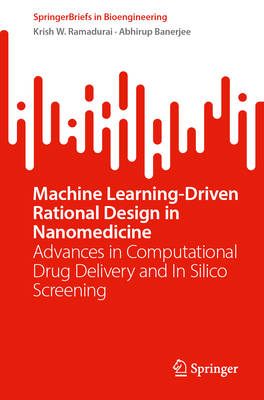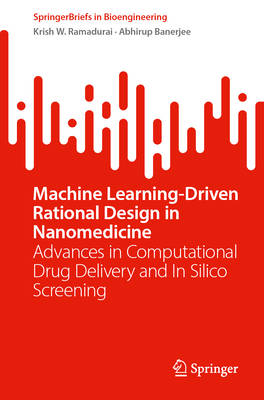
- Retrait gratuit dans votre magasin Club
- 7.000.000 titres dans notre catalogue
- Payer en toute sécurité
- Toujours un magasin près de chez vous
- Retrait gratuit dans votre magasin Club
- 7.000.0000 titres dans notre catalogue
- Payer en toute sécurité
- Toujours un magasin près de chez vous
Machine Learning-Driven Rational Design in Nanomedicine
Advances in Computational Drug Delivery and in Silico Screening
Krish W Ramadurai, Abhirup BanerjeeDescription
This book explores how machine learning is transforming nanomedicine, with a focus on the rational design of lipid nanoparticles (LNPs) for mRNA-based therapies. Moving beyond traditional, labor-intensive workflows, it highlights AI-driven methods--such as supervised learning, data augmentation, and deep learning--for predictive modeling and in silico screening.
Key topics include chemoinformatics, molecular fingerprinting, and strategies to optimize LNP transfection efficiency and biocompatibility. Real-world applications, including mRNA vaccines and personalized nanomedicines, illustrate the convergence of computational biology and pharmaceutical engineering. It also addresses the ethical considerations and regulatory challenges surrounding AI-driven drug development. This book is intended for researchers, pharmaceutical scientists, computational biologists, and professionals in the biotechnology industry who seek to leverage AI-driven methodologies in nanomedicine development.
Spécifications
Parties prenantes
- Auteur(s) :
- Editeur:
Contenu
- Nombre de pages :
- 70
- Langue:
- Anglais
- Collection :
Caractéristiques
- EAN:
- 9783032040114
- Date de parution :
- 15-10-25
- Format:
- Livre broché
- Format numérique:
- Trade paperback (VS)
- Dimensions :
- 155 mm x 235 mm

Les avis
Nous publions uniquement les avis qui respectent les conditions requises. Consultez nos conditions pour les avis.






